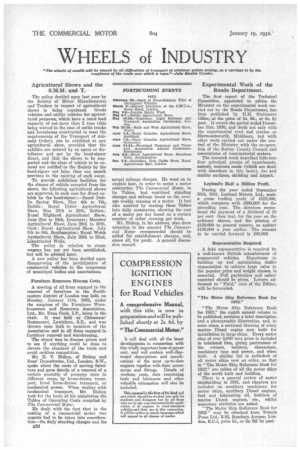WHEELS of INDUSTRY "The wheels of wealth will be slowed
Page 38

If you've noticed an error in this article please click here to report it so we can fix it.
by all difficulties of transport at whatever points arising, as a carriage is by the roughness of the roads over which it runs"—John Beattie Crozier.
Agricultural Shows and the S.M.M. and T.
The policy decided upon last year by the Society of Motor Manufacturers and Traders in respect of agricultural shows is being continued. Goods vehicles and utility vehicles for agricultural purposes, which have a rated load capacity of not more than 2 tons (this being waived in the case of cattle trucks and horseboxes constructed to meet the requirements of the Transport of Animals Order), can be exhibited at any agricultural show, provided that the exhibits are entered by ail agent or distributor and not by the bond-signer direct, and that the shows to be supported and the class of vehicle to be entered are notified to the Society by the bond-signer not later than one month previous to the opening of each event.
To provide exhibition facilities for the classes of vehicle excepted from the above, the following agricultural shows are approved, in each case for direct exhibit by the bond-signer:—Royal Dublin Spring Show, May 4th to 7th, Dublin; Royal Ulster Agricultural Show, May 25th to 28th, Belfast; Royal highland Agricultural Show, June 21st to 24th, Inverness ; Munster Agricultural Show, June 29th to 30th, Cork ; Royal Agricultural Show, July 5th to 9th, Southampton ; Royal Welsh Agricultural Show, July 20th to 22nd, Llandrinclod Wells.
The policy in relation to steam wagons has not yet been established, but will be advised later.
A new policy has been decided upon disapproving of the participation of commercial vehicles in the congresses of municipal bodies and associations.
Furniture Removers Discuss Costs.
A meeting of all firms engaged in the removal of furniture in the Southeastern district of London was held, on Monday, January 11th, 1032, under the auspices of the Furniture Warehousemen and Removers Association, Ltd., Mr. Evan Cook, T.P., being in the chair. It was held at Chiesmans' Restaurant, Lewisham, S.E., and was thrown open both to members of the Association and to all firms engaged in furniture removal and warehousing.
The object was to discuss prices and to see if anything could be done to elevate the standard of the trade and avoid reckless competition.
Mr. U. V. Bishop, of Bishop and Sons' Depositories, Ltd., London, S.W., spoke about the costs of moving furniture and gave details of a removal of a certain quantity of property done in different ways, by horse-drawn transport, hired horse-drawn transport, or mechanical power. When dealing with mechanical transport, Mr. Bishop took for the basis of his calculation the Tables of Operating Costs compiled by The Commercial Motor.
He dealt with the fact that in the costing of a commercial motor two aspects had to be taken into consideration—the daily, standing charges and the actual mileage charges. He went on to explain how, in order to assist a motor contractor, The Commercial Motor, in its Tables, had combined standing chars and mileage based on the average weekly running of a motor. It had also assisted by turning these Tables into daily summaries, showing the cost of a motor per day based on a certain number of miles' running per week.
Mr. Bishop, in his address, also drew attention to the amount The Commercial Motor recommended should be added for establishment charges, and, above alt, for profit. A general discussion ensued.




































































































